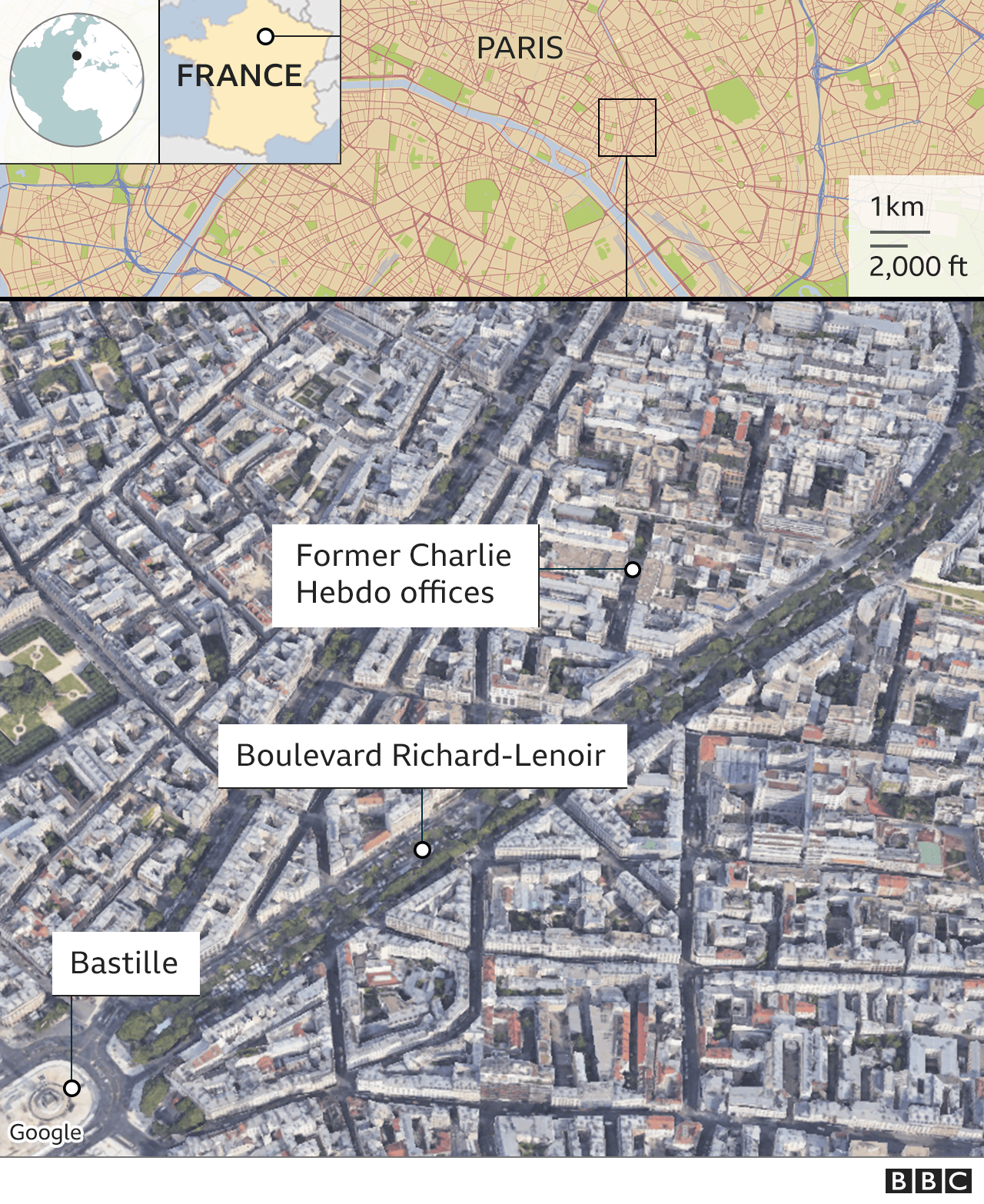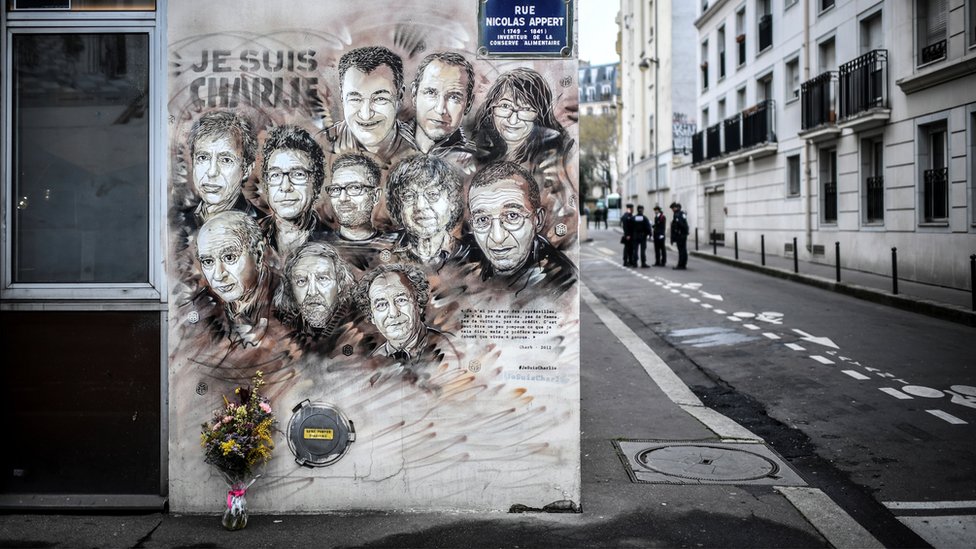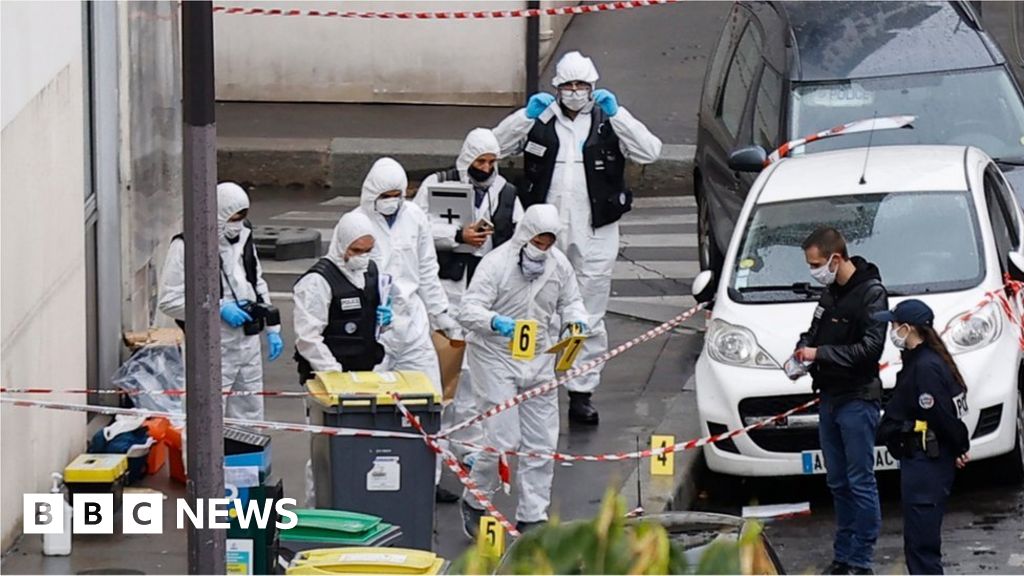image copyrightEPA
A man suspected of stabbing two people with a meat cleaver in Paris has admitted to deliberately targeting the former offices of the satirical Charlie Hebdo magazine, French media report.
The man, an 18-year-old born in Pakistan, reportedly linked his actions to the magazine’s recent republication of cartoons of the Prophet Mohammed.
Charlie Hebdo did this as a trial over the 2015 Islamist attack on the magazine which killed 12 people began.
The magazine’s location is now secret.
The building in the French capital’s 11th district which used to house Charlie Hebdo’s offices is now used by a television production company.
But the attacker apparently believed the magazine’s offices were still there, a source close to the investigation told the AFP news agency, confirming other French media reports.
The two victims of Friday’s attack have not been officially named but police said they were a man and woman who worked at the production company.
Prime Minister Jean Castex told reporters at the scene – near Boulevard Richard-Lenoir – that their lives were not in danger.
What is the suspect reported to have said?
The suspect, who was arrested not far from the scene on Friday, had “taken responsibility for his action”, sources told AFP, adding that he placed his actions “in the context of the republication of the cartoons”.
He has not been named, but French Interior Minister Gerald Darmanin said the teenager arrived in the country three years ago “as an isolated minor” of Pakistani nationality.
Six other people are in police custody over the stabbings, including a former flatmate of the main suspect. One man was released late on Friday after he was confirmed as a witness who had “chased the assailant”, reports say.
Mr Darmanin said the attack was “clearly an act of Islamist terrorism” and police had underestimated the threat level in the area.
He said he had ordered security to be stepped up around synagogues this weekend for Yom Kippur, the holiest day in the Jewish calendar.
How did the attack unfold?
Colleagues of the victims said they had been outside the Premieres Lignes news production agency smoking a cigarette when they were attacked.
The firm has offices in Rue Nicolas Appert, a street off Boulevard Richard-Lenoir. A mural honouring those killed in the January 2015 attack on Charlie Hebdo is nearby.
“I went to the window and saw a colleague, bloodied, being chased by a man with a machete,” one employee, who asked not to be named, said.
“They were both very badly wounded,” Paul Moreira, the founder and co-head of Premieres Lignes, told AFP.




Police quickly sealed off the area and a large blade was recovered nearby. Arrests were later carried out in the vicinity and during a search of a property north of Paris believed to be the main suspect’s home.
In a tweet, Charlie Hebdo expressed its “support and solidarity with its former neighbours… and the people affected by this odious attack”.
What about the new trial and republication of the cartoons?
Fourteen people went on trial earlier this month accused of helping two jihadists carry out the 2015 attack on Charlie Hebdo, killing 12 people in and around the magazine’s offices, including some of France’s most celebrated cartoonists.


The defendants are also accused of helping another jihadist carry out related attacks in Paris, killing five people, including a police officer.
The 17 victims were killed over a period of three days. All three attackers were killed by police.
The killings saw the beginning of a wave of jihadist attacks across France that left more than 250 people dead.
Charlie Hebdo marked the start of the trial by reprinting its controversial cartoons of the Prophet Muhammad. The original cartoons had sparked anger and protests in several Muslim-majority countries.
In response to the reprinting, the militant group al-Qaeda – which claimed the 2015 attack – renewed its threat against the magazine.

